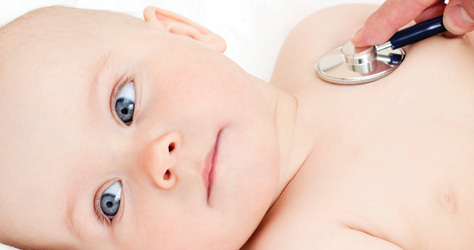Your 3 month old baby development milestones
Between two and three months your baby will discover their hands, maybe staring at them in fascination and trying to bring them towards their mouth. Efforts to control their hands may not be quite successful yet, but it’s a great spectator sport.
At a glance
- A baby’s brain makes thousands of connections a second, and you can almost see it whirring as they concentrate on a new skill
- Try putting something brightly-coloured, like a rattle, into their hands – they may be able to hold it for a few seconds
- Try tying a small soft toy to a ribbon or string and swing it slowly in front of your baby

Your baby’s senses at three months old
Touch
By three months old, you’ll find that your baby is beginning to develop more of a sense of the things around them and developing a new sense of touch. It’s possible to help your baby’s development further using different texture materials that your baby can play with and touch to further their experiences.
As well as different materials, it’s important that you get lots of skin to skin contact with your baby. Not only does it help the bonding experience of you and your baby, it can also be a real comfort for them if they’re upset or irritable.
A great way to increase the amount of skin to skin contact you gave with your baby is to try some baby massage. This can be as simple as rubbing some baby oil into your baby’s skin whilst talking to them.
Cause and effect
Before, when your baby managed to bat a dangling toy it may have been chance. But now they are beginning to learn the basics of cause and effect – when they hit something it moves. A baby’s brain makes thousands of connections a second, and you can almost see it whirring as they concentrate on a new skill.
Your baby’s motor skills at three months old
Rolling onto their tummy
Every week your baby’s neck is getting stronger and this is when daily ‘tummy time’ – a few minutes spent on their tummies - is important. It improves their co-ordination, muscles and the motor skills needed for movement. Start with five minutes a day and work up to 15/30 minutes. If they don’t like it, try getting down there with them. Watch out in the early days though – they won’t be able to hold their head up for long and you may have to dive in and rescue them from the nose -in-mat position.
Hello friends
Your baby won’t just smile at you now – its grins all round for any old adult who is prepared to smile first. They’re also becoming fascinated by other babies, especially their own reflection in the mirror.
Coordination
At three months old your baby will be in full motion moving their arms and legs around. You may find their joints are getting stronger and they’re able to kick stronger and in a more coordinated manner. You can use a range of toys or a mobile to help develop their hand-eye coordination.
Other 3 month old baby developments
Second round of Immunisations
At 3 months old your baby can have a second round of immunisations which include the following:
- Rotavirus – 2nd dose – A highly infectious virus that can cause gastroenteritis in your baby
- 6-in-1 vaccine – 2nd dose – Protects against diphtheria, hepatitis B, Hib (Haemophilus influenzae type b), polio, tetanus, whooping cough (pertussis)
- Pneumococcal Conjugate Vaccine (PCV) – This protects against pneumococcal infections including pneumonia, meningitis and bronchitis
How you can help your baby develop in month three
- Try putting something brightly-coloured, like a rattle, into their hands – they may be able to hold it for a few seconds. If you try the same trick with a crinkly toy, see what they do when it makes a noise
- If your baby didn’t like the baby gym last month and voiced their dislike by screaming the house down every time you put them under it (and this is pretty common), try again now. You might be surprised. Every toy has its moment
- Read to your baby. Showing your baby simple board books even at this young age is fantastic for tuning their ear in to the sounds and rhythm of language. If you’ve settled on a bedtime routine, add story time in
- Wrist rattles will help your baby develop more hand-eye co-ordination and muscle control as they work out how to operate it
Game of the month
Try tying a small soft toy to a ribbon or string and swing it slowly in front of your baby. Not only will they be able to track it with their eyes, they may try to take a swipe at it.
They're all different
A small note on developmental milestones: it’s really true – all babies are different and although we can encourage them, they will do things at their own pace and in their own time.